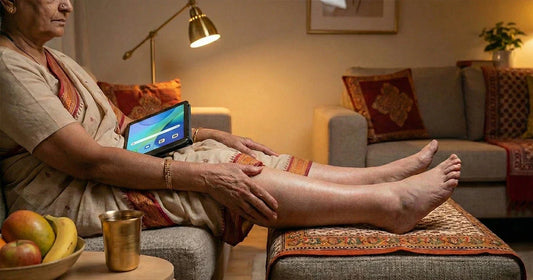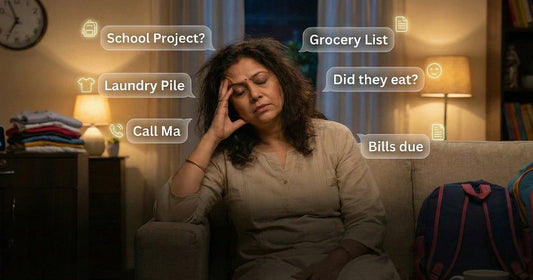Imagine a typical weekend afternoon in a household with kids. The room is filled with the sounds of video games, animated characters, or children scrolling through their favourite apps on a tablet or phone. It’s a familiar scene for most families today, with children spending hours glued to their screens. While technology can be an amazing tool for learning and entertainment, it comes at a cost, particularly when it comes to kids’ energy levels.
As children engage with digital screens, many parents are noticing a concerning trend: fatigue, irritability, and a lack of energy. If your child seems more tired than usual after a few hours of screen time, you're not alone. This modern dilemma of balancing screen time with healthy living is affecting many households, but fortunately, there are ways to fix it.
Let’s explore the effects of screen time on kids' energy and practical solutions for parents.
The Impact of Screen Time on Kids’ Energy Levels

Too much screen time is more than just an issue of missed outdoor playtime. In fact, it can have direct consequences on your child’s energy. Here's why-
-
Blue Light Fatigue
Screens emit blue light, which has been shown to interfere with sleep cycles. This disruption can lead to tiredness throughout the day.
-
Lack of Physical Activity
Children who spend long hours in front of screens miss out on essential physical activities that would help maintain their energy levels. This leads to a sedentary lifestyle that can negatively impact both their physical and mental energy.
-
Mental Fatigue
Constant stimulation from screens, such as video games or social media, can leave kids mentally exhausted. This makes it harder for them to focus or remain active.
Studies have shown that kids who spend more than 2 hours a day on screens tend to report lower energy levels and increased irritability. It’s no surprise that parents are concerned.
Understanding the Science Behind Screen Time and Energy
It’s important to understand how screen time affects your child’s energy. The relationship goes beyond just time spent on devices; it’s about what happens inside their bodies.
-
Dopamine Overload
The brain releases dopamine in response to rewards like likes, achievements, or goals in games. While dopamine gives kids a momentary high, prolonged exposure leads to mental exhaustion, leaving them with little energy for other tasks.
-
Eye Strain and Mental Fatigue
Staring at screens for long periods can lead to eye strain, headaches, and mental exhaustion, which, in turn, affect overall energy levels.
-
Impact on Metabolism
Being sedentary during screen time can slow down metabolism. This makes it more difficult for kids to burn energy effectively, leading to a feeling of sluggishness.
Signs That Your Child’s Energy is Being Affected by Screen Time
It's not always easy to tell when screen time is impacting your child's energy. However, here are some signs to watch out for-
-
Irritability and Mood Swings
If your child is easily upset or frustrated, screen time may be taking a toll on their mood and energy.
-
Lack of Focus
If your child has difficulty concentrating or seems tired during tasks that require focus, this may be a result of too much screen time.
-
Physical Sluggishness
A decrease in physical activity or the desire to engage in outdoor play is another sign of screen time fatigue.
-
Sleep Problems
If your child struggles to fall asleep or wake up in the morning, screen time before bed might be disrupting their sleep cycle.
How Parents Can Mitigate the Effects of Screen Time on Energy?
The good news is that parents can take steps to mitigate the negative effects of screen time on their kids’ energy levels:
-
Set Screen Time Limits
Implement daily screen time limits and encourage your child to take breaks every 30 minutes to an hour.
-
Encourage Physical Activity
Physical exercise is essential for maintaining energy levels. Encourage outdoor activities like biking, running, or playing sports to keep their bodies active.
-
Monitor Sleep Patterns
Ensure your child has a consistent bedtime and avoid screens at least one hour before sleep to promote better rest.
-
Promote Nutritional Support
A well-balanced diet and proper vitamins are key to maintaining high energy levels. Multivitamin supplements for kids can also support overall health and boost energy.
-
Engage in Non-Screen Activities
Offer alternatives to screen time, such as reading books, doing crafts, or playing games together. This not only reduces screen time but also promotes creativity and bonding.
Benefits of Proper Nutritional Support for Energy Maintenance

Maintaining high energy levels doesn’t just come from reducing screen time; proper nutrition plays a huge role. A balanced diet rich in vitamins and minerals can help your child stay active and alert throughout the day.
-
Vitamin B
B vitamins are crucial for energy production and metabolism, helping kids stay energised even during physical activities.
-
Vitamin D
Essential for bone health and immune function, Vitamin D also plays a role in boosting mood and energy levels.
-
Magnesium
This mineral is known for its energy-boosting properties and can help relax muscles and nerves.
For parents looking for a convenient way to support their child’s energy, kids’ nutrient supplements offer an excellent solution.
To Sum Up
While screens are an inevitable part of our kids' lives, it’s essential to find a balance between digital engagement and healthy habits. By setting limits on screen time, encouraging physical activity, and ensuring proper nutrition, parents can help their children maintain high energy levels throughout the day.
To further support their health and energy, consider adding U-Vita’s kids multivitamin supplements to their routine. This will ensure they get all the essential nutrients they need to thrive.
FAQ’s
How much screen time is too much for kids?
Experts recommend limiting screen time to no more than 2 hours per day for children aged 6 and older, with less for younger kids.
Can screen time affect my child's social skills?
Yes, excessive screen time can reduce face-to-face interactions, affecting a child's ability to develop social skills and emotional intelligence.
How does screen time impact my child’s posture?
Long periods of screen time can lead to poor posture, which can cause back, neck, and shoulder pain over time.
Are educational screens better than entertainment screens for kids’ energy?
While educational screens may be more stimulating, they still contribute to fatigue if overused. Balance is key.
Does screen time lead to poor eating habits?
Yes, excessive screen time can lead to mindless eating or snacking, contributing to poor dietary habits and lower energy.




















